六年级科教版英语知识点
- 格式:docx
- 大小:37.26 KB
- 文档页数:5
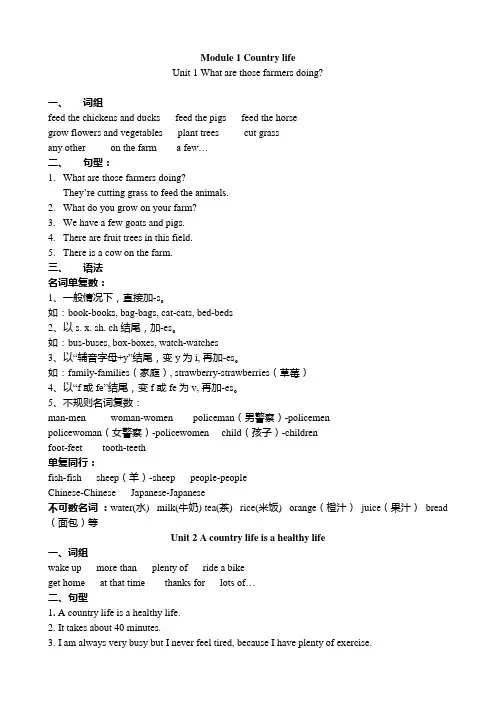
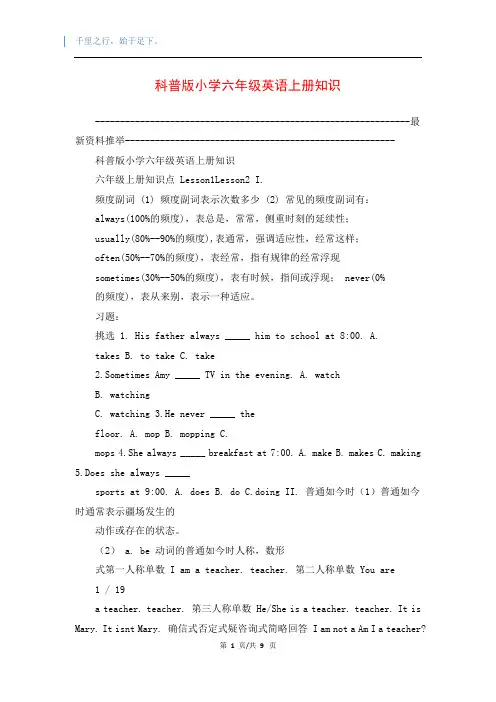
科普版小学六年级英语上册知识---------------------------------------------------------------最新资料推举------------------------------------------------------ 科普版小学六年级英语上册知识六年级上册知识点 Lesson1Lesson2 I.频度副词 (1) 频度副词表示次数多少 (2) 常见的频度副词有:always(100%的频度),表总是,常常,侧重时刻的延续性;usually(80%--90%的频度),表通常,强调适应性,经常这样;often(50%--70%的频度),表经常,指有规律的经常浮现sometimes(30%--50%的频度),表有时候,指间或浮现; never(0% 的频度),表从来别,表示一种适应。
习题:挑选 1. His father always _____ him to school at 8:00. A.takes B. to take C. take2.Sometimes Amy _____ TV in the evening. A. watchB. watchingC. watching 3.He never _____ thefloor. A. mop B. mopping C.mops 4.She always _____ breakfast at 7:00. A. make B. makes C. making 5.Does she always _____sports at 9:00. A. does B. do C.doing II. 普通如今时(1)普通如今时通常表示疆场发生的动作或存在的状态。
(2) a. be 动词的普通如今时人称,数形式第一人称单数 I am a teacher. teacher. 第二人称单数 You are1 / 19a teacher. teacher. 第三人称单数 He/She is a teacher. teacher. It is Mary. It isnt Mary. 确信式否定式疑咨询式简略回答 I am not a Am I a teacher?Yes, you are. No, you arent. Yes, I am. No, I not. Yes, he/she is. No, he/she isnt. Yes, it is . No, it isnt. Yes, you/we/they are. No,you/we/they arent. You arent a Are you a teacher? Is he/she a teacher? Is it Mary? He/She is not a 各人称复数 We/You/They are teachers.We/You/They are not teachers. Are we/you/they teachers? b.示意动词的普通如今时人称,数形式第一人称单数第三人称单数第二人称单数和各人称复数确信式否定式疑咨询式简略回答 I work. I dont work. Do I work? Yes, I do. No, I dont. He/She/It works. He/She/It doesnt work. Does he/she/it work? Yes, he/she/it does. No,he/she/it doesnt. We/You/They work. We/You/They dont work. Do we/you/they work? Yes, you/we/they do. No, you/we/they dont. 小贴士:实意动词普通如今时的用法:用好普通如今时,时刻状语需牢记。
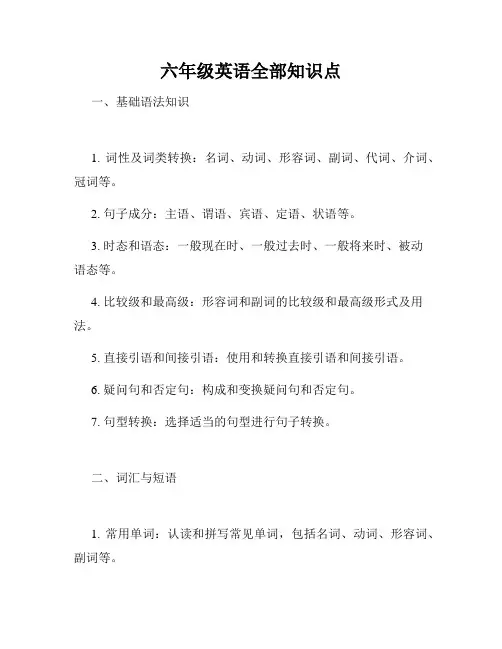
六年级英语全部知识点一、基础语法知识1. 词性及词类转换:名词、动词、形容词、副词、代词、介词、冠词等。
2. 句子成分:主语、谓语、宾语、定语、状语等。
3. 时态和语态:一般现在时、一般过去时、一般将来时、被动语态等。
4. 比较级和最高级:形容词和副词的比较级和最高级形式及用法。
5. 直接引语和间接引语:使用和转换直接引语和间接引语。
6. 疑问句和否定句:构成和变换疑问句和否定句。
7. 句型转换:选择适当的句型进行句子转换。
二、词汇与短语1. 常用单词:认读和拼写常见单词,包括名词、动词、形容词、副词等。
2. 词组和短语:学习常用的固定搭配和日常用语表达。
3. 同义词和反义词:学习常见词语的同义词和反义词。
三、阅读理解1. 短文理解:阅读短文,回答问题或完成相关任务。
2. 阅读策略:使用不同的阅读策略,如预测、推理、细节获取等。
3. 阅读技巧:学习如何快速定位信息,并理解文章的主旨和要点。
四、写作技巧1. 句子构造:运用所学的语法知识构造完整的句子。
2. 选择恰当的词汇:根据语境选择合适的词汇。
3. 写作规范:注意句子结构和标点符号的使用。
4. 表达观点:用简洁明了的语言表达自己的观点和意见。
五、口语表达1. 日常用语:学习基本的问候和日常用语表达。
2. 对话交流:练习进行简单的对话和交流。
3. 角色扮演:模拟真实场景,进行角色扮演对话。
六、听力技巧1. 听懂关键信息:提高听力理解能力,抓住关键信息。
2. 根据所听内容回答问题:通过听力材料回答问题或完成相关任务。
3. 跟读练习:提高发音和语调,跟读所听内容。
七、语法综合运用1. 完形填空:根据上下文语境,选择合适的词汇填空。
2. 语法填空:根据所给的语法规则和句子结构,填写正确的词语。
3. 句型转换:根据提示,将句子进行结构转换。
4. 语法错误改正:找出句子中的语法错误,并进行修改。
八、语言知识运用1. 单句翻译:将中文句子翻译成英文,或将英文句子翻译成中文。
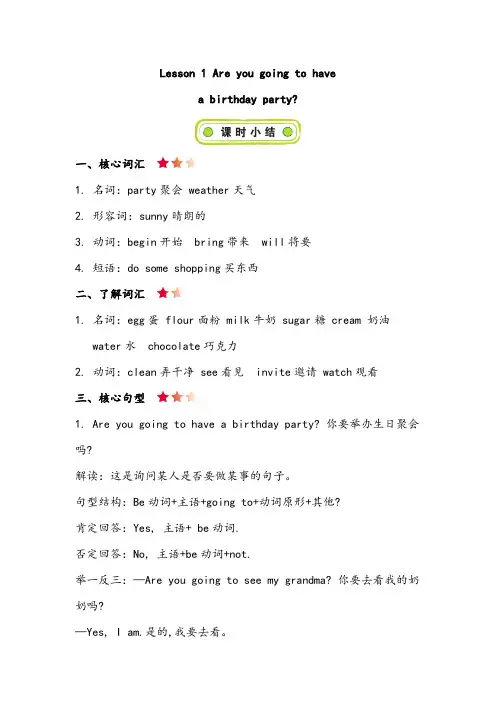
Lesson 1 Are you going to havea birthday party?一、核心词汇1. 名词:party聚会 weather天气2. 形容词:sunny晴朗的3. 动词:begin开始 bring带来 will将要4. 短语:do some shopping买东西二、了解词汇1. 名词:egg蛋 flour面粉 milk牛奶 sugar糖 cream 奶油water水 chocolate巧克力2. 动词:clean弄干净 see看见 invite邀请 watch观看三、核心句型1. Are you going to have a birthday party? 你要举办生日聚会吗?解读:这是询问某人是否要做某事的句子。
句型结构:Be动词+主语+going to+动词原形+其他?肯定回答:Yes, 主语+ be动词.否定回答:No, 主语+be动词+not.举一反三:—Are you going to see my grandma? 你要去看我的奶奶吗?—Yes, I am.是的,我要去看。
—Is she going to do some shopping? 她要买东西吗?—No, she isn’t. 不,她不要买。
2. My birthday is coming. 我的生日要到了。
解读:这是描述某个日子要到了的句子。
句型结构:主语+ be动词+动词的-ing形式+其他.举一反三:The winter holiday is coming. 寒假快到了。
3. I’m going to have a party at home next Sunday evening. 下个星期日晚上我要在家里举办一场聚会。
解读:这是描述某人要做某事的句子。
句型结构:主语+be动词+going to+动词原形+其他.举一反三: I’m going to watch TV this afternoon. 今天下午我要看电视。
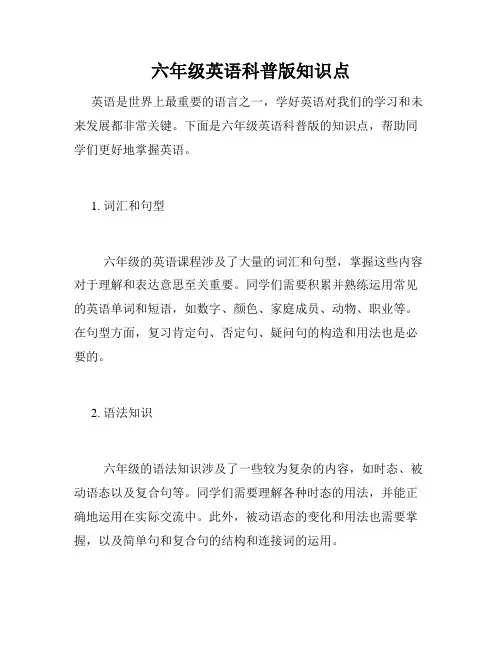
六年级英语科普版知识点英语是世界上最重要的语言之一,学好英语对我们的学习和未来发展都非常关键。
下面是六年级英语科普版的知识点,帮助同学们更好地掌握英语。
1. 词汇和句型六年级的英语课程涉及了大量的词汇和句型,掌握这些内容对于理解和表达意思至关重要。
同学们需要积累并熟练运用常见的英语单词和短语,如数字、颜色、家庭成员、动物、职业等。
在句型方面,复习肯定句、否定句、疑问句的构造和用法也是必要的。
2. 语法知识六年级的语法知识涉及了一些较为复杂的内容,如时态、被动语态以及复合句等。
同学们需要理解各种时态的用法,并能正确地运用在实际交流中。
此外,被动语态的变化和用法也需要掌握,以及简单句和复合句的结构和连接词的运用。
3. 阅读技巧六年级的英语科普版教材中包含了一些有趣和有意义的短文,通过阅读这些短文可以帮助同学们增强阅读理解能力。
同学们应该学会如何快速获取关键信息,并能提炼出文章的主旨、重点和细节。
此外,还应该注意识别上下文的提示词语,从而推断词义和解答问题。
4. 听力训练六年级的英语科普版教材也包含了一些听力材料,通过听力训练可以提高同学们的听力理解能力。
同学们需要注意材料中的关键信息,如数字、时间、人物等,同时也要能够正确回答问题。
为了更好地掌握听力技巧,同学们可以多听英语材料,如英语歌曲、英语新闻等。
5. 口语表达在六年级,口语表达能力的培养也非常重要。
同学们应该多参与英语口语练习,可以和同学们一起进行对话和角色扮演,同时也可以通过跟随录音或视频进行模仿练习。
除了课堂上的口语练习,同学们还可以参加英语角或加入英语俱乐部等活动,提高与他人用英语交流的机会。
总结:六年级英语科普版的知识点包括词汇和句型、语法知识、阅读技巧、听力训练和口语表达。
同学们应该注重积累词汇,理解句型的用法,掌握各种语法知识,培养阅读和听力技巧,并积极参与口语练习。
通过努力学习和练习,将有助于同学们更好地掌握英语,提高英语应用能力,为将来的学习和工作奠定良好的基础。
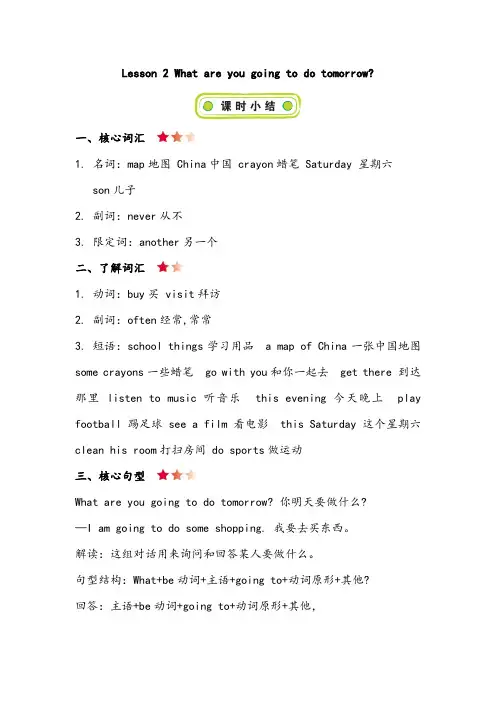
Lesson 2 What are you going to do tomorrow?一、核心词汇1. 名词:map地图 China中国 crayon蜡笔 Saturday 星期六son儿子2. 副词:never从不3. 限定词:another另一个二、了解词汇1. 动词:buy买 visit拜访2. 副词:often经常,常常3. 短语:school things学习用品 a map of China一张中国地图some crayons一些蜡笔 go with you和你一起去 get there 到达那里 listen to music听音乐 this evening今天晚上 play football踢足球 see a film看电影 this Saturday这个星期六clean his room打扫房间 do sports做运动三、核心句型What are you going to do tomorrow? 你明天要做什么?—I am going to do some shopping. 我要去买东西。
解读:这组对话用来询问和回答某人要做什么。
句型结构:What+be动词+主语+going to+动词原形+其他?回答:主语+be动词+going to+动词原形+其他,举一反三:—What are you going to do next Sunday? 你下个星期日要做什么?—I’m going to play football. 我要踢足球。
—What is he going to do this afternoon? 他今天下午要做什么? —He’s going to visit his friend. 他要拜访他的朋友。
四、了解句型Do you want to know why? 你想知道为什么吗?解读:这是询问某人是否想要做某事的句子。
句型结构:Do you want to +动词原形+其他?举一反三:Do you want to watch TV? 你想看电视吗?。
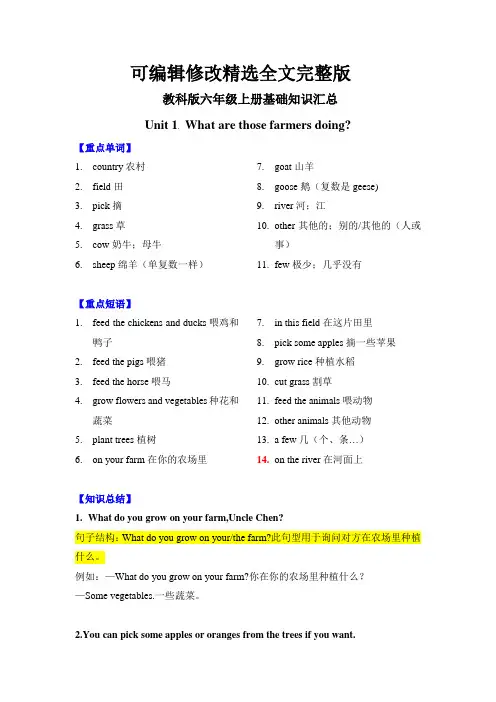
可编辑修改精选全文完整版教科版六年级上册基础知识汇总Unit 1 What are those farmers doing? 【重点单词】1.country农村2.field田3.pick摘4.grass草5.cow奶牛;母牛6.sheep绵羊(单复数一样)7.goat山羊8.goose鹅(复数是geese)9.river河;江10.other其他的;别的/其他的(人或事)11.few极少;几乎没有【重点短语】1.feed the chickens and ducks喂鸡和鸭子2.feed the pigs喂猪3.feed the horse喂马4.grow flowers and vegetables种花和蔬菜5.plant trees植树6.on your farm在你的农场里7.in this field在这片田里8.pick some apples摘一些苹果9.grow rice种植水稻10.cut grass割草11.feed the animals喂动物12.other animals其他动物13.a few几(个、条…)14.on the river在河面上【知识总结】1.What do you grow on your farm,Uncle Chen?句子结构:What do you grow on your/the farm?此句型用于询问对方在农场里种植什么。
例如:—What do you grow on your farm?你在你的农场里种植什么?—Some vegetables.一些蔬菜。
2.You can pick some apples or oranges from the trees if you want.句子结构:You can十动词(短语)原形十if you want..此句型用于表达“如果你想要的话,你可以…”。
if是连词,在这里用于引导条件状语从句,意为“如果”。
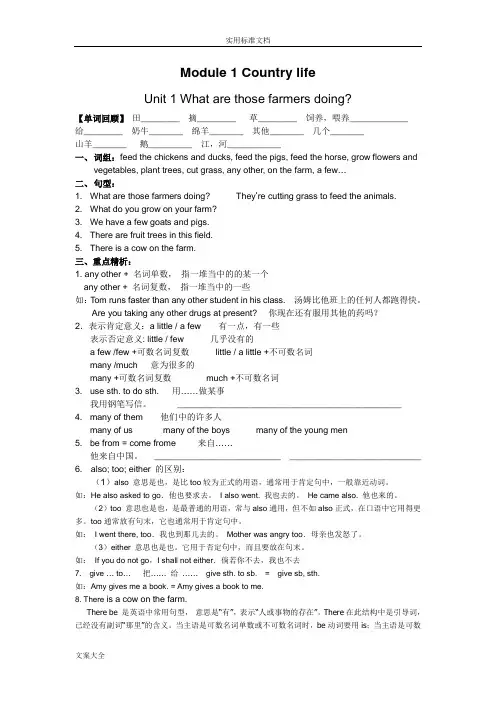
Module 1 Country lifeUnit 1 What are those farmers doing?【单词回顾】田________ 摘________ 草________ 饲养,喂养____________给________ 奶牛_______ 绵羊_______ 其他_______ 几个_______山羊_______ 鹅_________ 江,河___________一、词组:feed the chickens and ducks, feed the pigs, feed the horse, grow flowers andvegetables, plant trees, cut grass, any other, on the farm, a few…二、句型:1. What are those farmers doing? They’re cutting grass to feed the animals.2. What do you grow on your farm?3. We have a few goats and pigs.4. There are fruit trees in this field.5. There is a cow on the farm.三、重点精析:1. any other + 名词单数,指一堆当中的的某一个any other + 名词复数,指一堆当中的一些如:T om runs faster than any other student in his class. 汤姆比他班上的任何人都跑得快。
Are you taking any other drugs at present? 你现在还有服用其他的药吗?2.表示肯定意义:a little / a few 有一点,有一些表示否定意义: little / few 几乎没有的a few /few +可数名词复数little / a little +不可数名词many /much 意为很多的many +可数名词复数much +不可数名词3. use sth. to do sth. 用……做某事我用钢笔写信。
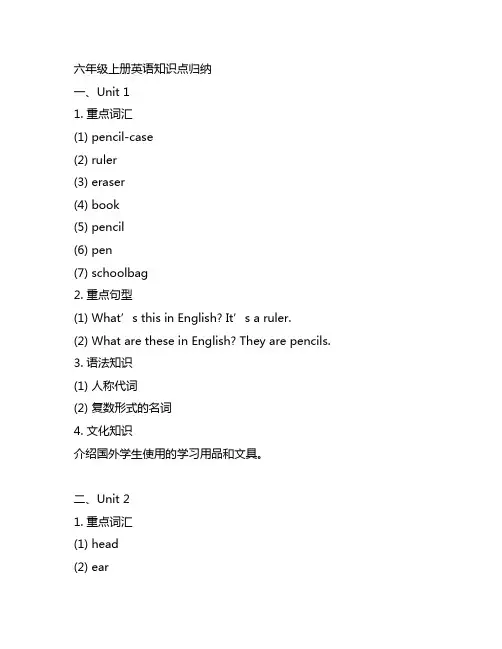
六年级上册英语知识点归纳一、Unit 11. 重点词汇(1) pencil-case(2) ruler(3) eraser(4) book(5) pencil(6) pen(7) schoolbag2. 重点句型(1) What’s this in English? It’s a ruler.(2) What are these in English? They are pencils.3. 语法知识(1) 人称代词(2) 复数形式的名词4. 文化知识介绍国外学生使用的学习用品和文具。
二、Unit 21. 重点词汇(1) head(2) ear(4) nose(5) mouth(6) arm(7) hand(8) leg(9) foot2. 重点句型(1) What’s this? It’s a head.(2) How many…? Seven.3. 语法知识(1) 物主代词(2) 数词的用法4. 文化知识介绍头部及身体的基本部位名称,让学生了解自己的身体。
三、Unit 31. 重点词汇(1) red(2) green(3) yellow(4) blue(5) black(7) orange2. 重点句型(1) What color is it? It’s red.(2) What’s your favorite color? My favorite color is blue.3. 语法知识(1) 形容词性物主代词及名词性物主代词(2) 形容词的用法4. 文化知识介绍基本颜色的英语名称,并引导学生表达自己喜爱的颜色。
四、Unit 41. 重点词汇(1) father(2) mother(3) brother(4) sister(5) grandfather(6) grandmother(7) family2. 重点句型(1) Who is he? He is my brother.(2) How many people are there in your family? Five.3. 语法知识(1) 动词be的用法(2) 物主代词的用法4. 文化知识介绍家庭成员及家庭人数,并让学生用英语介绍自己的家庭。
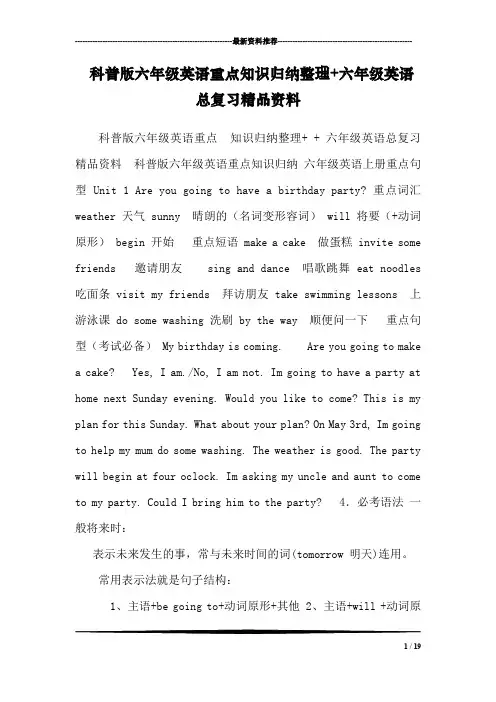
---------------------------------------------------------------最新资料推荐------------------------------------------------------科普版六年级英语重点知识归纳整理+六年级英语总复习精品资料科普版六年级英语重点知识归纳整理+ + 六年级英语总复习精品资料科普版六年级英语重点知识归纳六年级英语上册重点句型 Unit 1 Are you going to have a birthday party? 重点词汇weather 天气 sunny 晴朗的(名词变形容词) will 将要(+动词原形) begin 开始重点短语 make a cake 做蛋糕 invite some friends 邀请朋友 sing and dance 唱歌跳舞 eat noodles 吃面条 visit my friends 拜访朋友 take swimming lessons 上游泳课 do some washing 洗刷 by the way 顺便问一下重点句型(考试必备) My birthday is coming. Are you going to makea cake? Yes, I am./No, I am not. Im going to have a party at home next Sunday evening. Would you like to come? This is my plan for this Sunday. What about your plan? On May 3rd, Im goingto help my mum do some washing. The weather is good. The party will begin at four oclock. Im asking my uncle and aunt to cometo my party. Could I bring him to the party? 4.必考语法一般将来时:表示未来发生的事,常与未来时间的词(tomorrow 明天)连用。
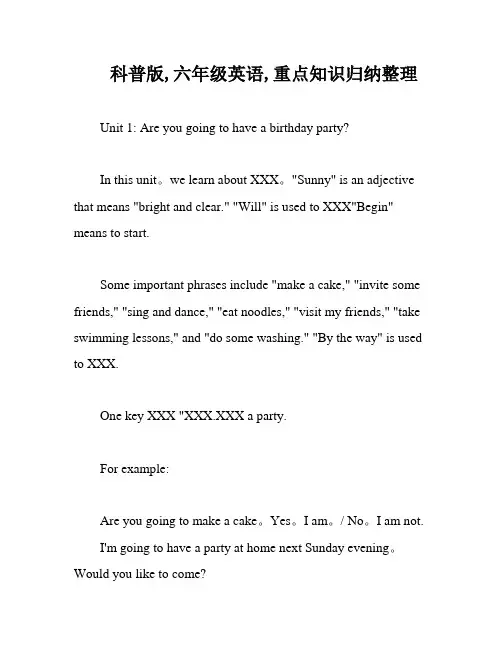
科普版,六年级英语,重点知识归纳整理Unit 1: Are you going to have a birthday party?In this unit。
we learn about XXX。
"Sunny" is an adjective that means "bright and clear." "Will" is used to XXX"Begin" means to start.Some important phrases include "make a cake," "invite some friends," "sing and dance," "eat noodles," "visit my friends," "take swimming lessons," and "do some washing." "By the way" is used to XXX.One key XXX "XXX.XXX a party.For example:Are you going to make a cake。
Yes。
I am。
/ No。
I am not.I'm going to have a party at home next Sunday evening。
Would you like to come?We also learn to talk about our plans for the future using the simple future tense。
To form this tense。
we use "will" or "be going to" followed by a verb。
科普版小学六年级英语上册学习知识点六年级上册知识点Lesson1&Lesson2I.频度副词(1)频度副词表示“次数多少”(2)常见的频度副词有:always(100%的频度),表“总是,常常”,侧重时刻的延续性; usually(80%--90%的频度),表“通常”,强调适应性,经常这样; often(50%--70%的频度),表“经常,”指有规律的经常浮现‘ sometimes(30%--50%的频度),表“有时候”,指间或浮现;never(0%的频度),表“从来别”,表示一种适应。
习题:挑选1.His father always _____ him to school at 8:00.A. takesB. to takeC. take2.Sometimes Amy _____ TV in the evening.A. watchB. watchingC. watching3.He never _____ the floor.A. mopB. moppingC. mops4.She always _____ breakfast at 7:00.A. makeB. makesC. making5.Does she always _____ sports at 9:00.A. doesB. doC.doingII.普通如今时(1)普通如今时通常表示疆场发生的动作或存在的状态。
(2) a. be动词的普通如今时b.示意动词的普通如今时小贴士:III.词汇合中营Lesson3&Lesson4I.特别疑咨询句(1)特别疑咨询句是对句子某一部分提咨询的句子。
(2)常见的疑咨询词有:词汇加油站:Lesson5&Lesson6(Review)I.常见的表交通工具方式walk=on foot 走路 by bus 乘公交by train 乘火车 by air=by plane乘飞机by ship 乘船 by bike骑自行车by car 乘汽车II.方位介词(1)方位介词是表示位置和地方的介词。
科教版六年级上册英语阅读与理解专项综合知识点班级:_____________ 姓名:_____________1. 阅读短文,根据短文内容选择正确的答案。
Mr. Brown lived in a small town, but he worked in a big city. So he moved there with his wife and two children last Tuesday. On the next day, Mr. Brown took his new car out and was washing it. When a friend came, the friend stopped and looked at the new car for a minute. Then Mr. Brown turned and saw him. The friend said, 'That''s a new car. Is it yours?' 'Sometimes.' Mr. Brown answered. The friend was surprised.'Sometimes?' he said, 'What do you mean?' Mr. Brown answered slowly, 'Well, when there''s a party in town, my daughter, Jean drives it. When there''s a football game, it''s my son Joe''s turn. When I have washed it and it looks really nice and clean, my wife Linda uses it. And when it needs cleaning, it''s mine.'(1)How many people are there in Mr. Brown''s family?( )A. OneB. TwoC. ThreeD. Four(2)________ drives the car when there''s a party in town.( )A. Mr. Brown''s daughterB. Mr. Brown''s sonC. Mr. Brown''s wifeD. Mr. Brown(3)From the passage, we know Mr. Brown''s son likes ________.( )A. washing the carB. football gamesC. partiesD. nothing(4)What do you think of Mr. Brown?( )A. He likes washing the car.B. He likes parties.C. He''s kind to his families.D. He likes football games.2. 阅读短文。
科教版2021年六年级上学期英语阅读与理解专项知识点班级:_____________ 姓名:_____________1. 阅读理解。
Peter is a pupil. He is always absent-minded (心不在焉) in class. His father and mother always tell him to listen to teacher carefully in class. “Don’t be absent-minded again.” His teachers think a lot to change (改变) him, “Look at us when you are in class. Don’t be absent-minded. ”Peter answers, “OK, I will. ”One day Peter is in the English class. He is looking out of the window and smiling. His English teacher asks the class, “Say two pronouns, please. Please answer my question.” Peter looks at his teacher is surprise (吃惊地) and stands up, “ Who? Me?”“ Good. Sit down, please.”根据短文内容,判断句子正(T),误(F)。
[1]Peter is a good pupil. (____)[2]Peter’s father, mother and teachers think a lot to change him. (____)[3]Peter doesn’t change his habit. (____)[4]Peter knows the answer to the teacher’s question. (____)[5]Peter’s teacher thinks Peter knows the answer. (____)2. 阅读理解。
六年级科普英语知识点Science Education for Sixth GradersScience is an essential subject that helps us understand the world around us. In sixth grade, students are introduced to a wide range of scientific concepts and principles. This article aims to provide an overview of key scientific knowledge that sixth graders should be familiar with.1. Matter and EnergyMatter is anything that occupies space and has mass, while energy is the ability to do work. In sixth grade, students learn about different states of matter, including solids, liquids, and gases. They also explore the concept of energy and its various forms, such as light, heat, and sound. Understanding the relationship between matter and energy is crucial for comprehending many scientific phenomena.2. The Solar SystemThe solar system consists of the sun, planets, moons, and other celestial bodies that orbit around the sun. Sixth grade students delve into the solar system's structure and characteristics. They explore the eight planets, their order from the sun, and important facts about eachplanet. Additionally, they learn about asteroids, comets, and the differences between natural and artificial satellites.3. Forces and MotionForces are pushes or pulls that can change the motion of an object. Sixth graders study basic principles of motion, including speed, velocity, and acceleration. They learn how forces can affect motion and explore concepts such as gravity, friction, and air resistance. Through hands-on activities and experiments, students develop a deeper understanding of these fundamental concepts.4. Ecosystems and BiodiversityAn ecosystem is a community of living organisms interacting with one another and their physical environment. Sixth grade science education emphasizes the importance of biodiversity within ecosystems. Students explore different ecosystems such as forests, grasslands, and aquatic habitats. They learn about food chains, interdependence among species, and the impact of human activities on biodiversity.5. Earth's ProcessesSixth graders also gain knowledge about various processes operating on Earth. This includes understanding weather patterns, thewater cycle, and the formation of different landforms such as mountains, valleys, and rivers. Students learn about natural disasters like earthquakes, volcanoes, and tsunamis, and how these events shape the Earth's surface.6. Scientific InquiryIn addition to specific scientific topics, sixth-grade science education emphasizes the process of scientific inquiry. Students learn to ask questions, design experiments, collect data, and draw conclusions based on evidence. They develop critical thinking and problem-solving skills through hands-on investigations and collaborative group work.ConclusionThe sixth-grade science curriculum provides students with a solid foundation in various scientific principles. From matter and energy to the solar system, forces and motion, ecosystems, Earth's processes, and scientific inquiry, students gain valuable knowledge and skills. By fostering a curiosity for the natural world, sixth graders can better understand and appreciate the scientific wonders that surround them.。
科教版英语六年级知识点一、数字(Number)在六年级的科教版英语课程中,数字是一个重要的知识点。
学生需要学会认识、读写以及运用数字。
1. 认识数字孩子们需要从1到100之间逐一认识数字,识别数字的形状和大小。
2. 数字的读法了解数字的读法能够帮助学生准确地表达数字,比如十位数和个位数之间的读法,例如23可以读作twenty-three。
3. 数字的顺序学生需要学习数字的顺序,包括自然数的顺序,比较大小以及正序和逆序排列等。
二、时间(Time)在六年级的科教版英语课程中,学生需要学会表达时间、询问时间以及描述日常活动的时间顺序。
1. 识别时间表达方式学生需要识别并学会使用数字、英文单词以及句子来表达时间,比如数字表达法、用英文单词表达日期,以及“早上”、“下午”、“晚上”等时间段的表达方式。
2. 询问时间学生需要学会用正确的语法和表达方式来询问他人的时间,例如“几点了?”、“今天星期几?”等。
3. 描述时间顺序通过学习时间的用词和句式,学生能够描述日常活动的时间顺序,比如早上起床、上学、吃午饭以及放学等。
三、日常生活(Daily Life)六年级的科教版英语课程中,常常涉及到学生们的日常生活,从起床到就寝的活动都需要学生掌握相应的英语表达。
1. 个人信息学生需要学会用英语表达自己和他人的个人信息,包括姓名、年龄、家庭成员等。
2. 日常活动学生需要学会用英语描述日常活动的内容和顺序,比如洗脸、刷牙、吃早饭等。
3. 日常用语学生需要学会用英语表达和回应一些日常场景中常用的用语,比如问候、道歉、感谢等。
四、周边环境(Environment)在六年级的科教版英语课程中,学生需要学会描述自己周边的环境,包括家庭、学校、社区等。
1. 家庭成员学生需要学会用英语描述自己家庭成员的关系和基本信息,包括父母、兄弟姐妹等。
2. 学校环境学生需要学会用英语表达自己学校的位置、建筑、教室、操场等,还包括学校的设施、规则和活动等。
六年级科教版英语知识点一、动词时态
1. 现在时:表示现在正在进行或经常发生的动作。
例句:I play basketball every afternoon.
2. 过去时:表示过去发生的动作或存在的状态。
例句:He walked to school yesterday.
3. 将来时:表示将要发生的动作或存在的状态。
例句:We will visit the museum tomorrow.
二、名词复数形式
1. 一般名词复数形式:在名词末尾加-s。
例句:There are many books on the shelf.
2. 以-y结尾的名词复数形式:将-y改为-ies。
例句:The ladies are chatting in the garden.
3. 不规则名词复数形式:单复数形式不规则的名词。
例句:The children are playing in the park.
三、形容词比较级和最高级
1. 比较级的构成:在形容词前加-er。
例句:She is taller than her sister.
2. 最高级的构成:在形容词前加-est。
例句:This is the happiest day of my life.
四、人称代词
1. 主格:用于主语位置。
例句:He is a student.
2. 宾格:用于动词或介词后。
例句:She is with me.
3. 物主代词:表示所属关系。
例句:This is my book.
五、情态动词
1. can:表示能力或许可。
例句:I can swim in the pool.
2. could:表示过去的能力或许可。
例句:He could run very fast when he was young.
3. may:表示许可或推测。
例句:May I go to the restroom, please?
六、疑问句
1. 一般疑问句:在句首加助动词或情态动词。
例句:Can you swim?
2. 特殊疑问句:以疑问词开头。
例句:What is your name?
3. 选择疑问句:在句中用or连接两个选择项。
例句:Do you want tea or coffee?
七、介词
1. in:表示在某个位置或时间段。
例句:He is in the classroom.
2. on:表示在某个平面或表面上。
例句:The book is on the table.
3. at:表示在某个具体位置。
例句:We will meet at the park.
八、连词
1. and:表示并列关系。
例句:I like apples and bananas.
2. but:表示转折关系。
例句:He is young, but he is very talented.
3. or:表示选择关系。
例句:Would you like tea or coffee?
以上是六年级科教版英语的一些重要知识点,希望对你的学习
有所帮助。
通过掌握这些知识,你将能够更好地理解和运用英语,提高你的英语水平。
加油!。